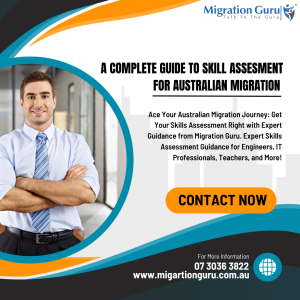If you’re aiming to migrate to Australia, one of the most critical steps you need to take is passing the skills assessment for your occupation. The skills assessment is a mandatory process for most skilled migration visas, designed to evaluate whether your qualifications and work experience meet the standards required for your nominated occupation in Australia.
This guide will walk you through the basics of the skills assessment process, the different authorities responsible for assessing various professions, and tips to ensure your assessment is successful.
 What Is a Skills Assessment?
What Is a Skills Assessment?
A skills assessment is an evaluation conducted by a designated skills assessment authority. It determines whether your qualifications, work experience, and skills align with the requirements of the Australian labor market for your specific occupation. The outcome of this assessment is crucial for applying for certain skilled migration visas, such as the Subclass 189, Subclass 190, and Subclass 491 visas.
Each occupation is linked to a specific skills assessment authority, and the assessment process differs depending on the assessing body and the nature of the occupation. Below are the key authorities responsible for different professions.
Key Skills Assessment Authorities for Migration
1. Australian Computer Society (ACS) – For ICT Professionals
ICT professionals, including software developers, systems analysts, and network engineers, need to have their qualifications and work experience assessed by the Australian Computer Society (ACS). The ACS ensures that your skills match the standards of Australia’s ICT industry. You will need to submit educational qualifications, detailed job descriptions, and references proving your work experience in the ICT field.
2. Engineers Australia (EA) – For Engineers
If you’re an engineer in disciplines like Civil, Mechanical, or Electrical, Engineers Australia (EA) is your assessing authority. EA evaluates your skills based on the Competency Demonstration Report (CDR), which showcases your engineering skills through real-world projects. The CDR is a critical component of the assessment, and you must carefully prepare it to demonstrate your competencies.
3. VETASSESS – For General Professional Occupations
VETASSESS is one of the largest assessing bodies and covers a wide range of general professional occupations that are not assessed by other specific authorities. If you’re a management consultant, marketing professional, or in hospitality, VETASSESS is likely your assessment authority. They evaluate qualifications and work experience through a points-based system and detailed documentation.
4. Trades Recognition Australia (TRA) – For Trade Occupations
Trades Recognition Australia (TRA) is responsible for assessing qualifications and experience for skilled trade workers. This includes occupations like electricians, carpenters, chefs, and plumbers. TRA ensures that your trade qualifications meet Australian standards, and in some cases, you may need to undergo practical assessments.
5. Australian Institute for Teaching and School Leadership (AITSL) – For Teachers
If you’re a school teacher, AITSL is the designated authority to assess your qualifications and teaching experience. AITSL has strict requirements for recognized teaching qualifications and may require evidence of English language proficiency. Ensure your qualifications are in line with Australian teaching standards before applying.
6. Australian Nursing and Midwifery Accreditation Council (ANMAC) – For Nurses and Midwives
Nurses and midwives seeking migration must have their qualifications and experience assessed by ANMAC. The assessment process requires you to provide evidence of your nursing qualifications, professional registration, and recent work experience in the nursing field.
7. Australian Medical Council (AMC) – For Medical Practitioners
AMC assesses medical practitioners, including doctors and specialists. The process includes evaluating your medical qualifications and often requires passing additional medical exams to ensure that your skills meet Australian healthcare standards.
8. Chartered Accountants Australia and New Zealand (CAANZ), Certified Practising Accountants (CPA) Australia, and Institute of Public Accountants (IPA) – For Accountants
Accountants have three assessing authorities: CAANZ, CPA Australia, and IPA. Each body has slightly different criteria, but all assess qualifications, professional memberships, and work experience to ensure they meet Australian standards for accounting professionals.
9. Other Assessing Authorities
- Australian Dental Council (ADC) – For dentists.
- Australian Physiotherapy Council (APC) – For physiotherapists.
- Occupational Therapy Council (OTC) – For occupational therapists.
- Pharmacy Board of Australia (PBA) – For pharmacists.
- Architects Accreditation Council of Australia (AACA) – For architects.
Steps for Skills Assessment
- Identify the Relevant Authority: Based on your occupation, you will need to refer to the Skilled Occupation List (SOL) or the Medium and Long-term Strategic Skills List (MLTSSL) to determine the correct assessment authority. You can then review the specific requirements for your assessment.
- Prepare Documentation: Each authority has specific documentation requirements. You will typically need to provide:
- Academic qualifications (degrees, diplomas, certifications)
- Proof of work experience (employment references, job descriptions, and pay slips)
- Proof of identity (passport, birth certificate)
- English language proficiency test results (e.g., IELTS, TOEFL) if required
- Submit Application: Applications are usually submitted online through the assessment authority’s portal. Be prepared to pay assessment fees, which can range from AUD 500 to AUD 1500, depending on the authority and occupation.
- Assessment Review: The assessment authority will review your application and documentation. Processing times vary, but they generally take several weeks to several months.
- Outcome: Once your skills have been assessed, you will receive a formal assessment outcome. If successful, you can use this outcome to apply for a skilled migration visa.
Tips for a Successful Assessment
- Ensure Alignment with Your Nominated Occupation: One of the common reasons for rejection is a mismatch between your job duties and the nominated occupation. Make sure that your work experience aligns closely with the ANZSCO code for your occupation.
- Prepare Your Documents Carefully: Missing or incorrect documents are another frequent reason for delays or rejections. Ensure that all documents are properly certified and meet the authority’s requirements.
- Stay Updated on Criteria: Assessment bodies often update their requirements. For example, TRA and VETASSESS frequently revise their criteria, so it’s important to check for the latest guidelines before submitting your application.
- Seek Professional Help if Needed: Navigating the skills assessment process can be complicated. If you’re unsure about any part of the process, seeking advice from migration experts, such as Migration Guru, can help ensure a smooth application process.
Final Thoughts
Passing your skills assessment is a vital step in the Australian skilled migration process. By understanding the requirements of your assessment authority and carefully preparing your documentation, you can improve your chances of success. Whether you’re an engineer, nurse, accountant, or tradesperson, the right preparation will set you on the path to achieving your Australian migration dream.
For more information or assistance with your skills assessment, contact Migration Guru:
- Website: www.migrationguru.com.au
- LinkedIn: Migration Guru Pty Ltd
- Facebook: Migration Guru
- Email: info@migrationguru.com.au
- Phone: +61-0730363800

 What Is a Skills Assessment?
What Is a Skills Assessment?